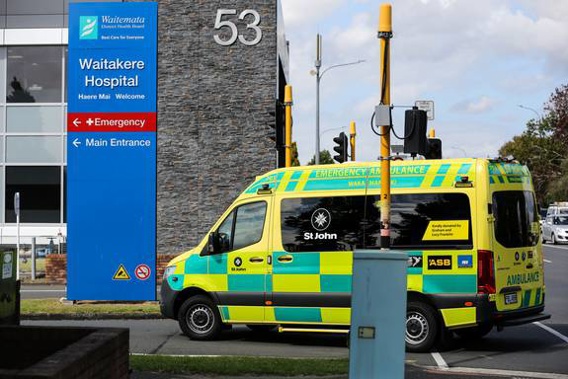
Elderly patients say they were moved from beds to chairs at Waitākere Hospital in the early hours of the morning to free up space for new admissions.
One patient’s family described the practice as “hot-bedding”, while the hospital said it was a safe, necessary measure to minimise wait times.
It comes as hospitals around the country face intense pressure this winter - with Christchurch Hospital yesterday taking the unusual step of issuing a public statement warning of long wait times and apologising to those in long queues.
On Saturday, July 1, Sumintra Bahadur, 83, went to Waitākere Hospital emergency department with a range of symptoms including an irregular heartbeat.
She was moved about midnight to the Acute Diagnostic Unit and given a bed.
Her family said she was woken at 6am along with other patients in the unit and told she was being moved into a chair.
Five other patients in her ward were also placed in chairs in the same room, including one who was attached to medical equipment.
“I just could not believe it,” said Bahadur’s son Prem, who found her in the chair when he arrived at the hospital at 8am. She remained there until she was seen by a doctor at 12.45pm on Sunday, before being discharged for monitoring at home by her GP later that afternoon.
“It didn’t matter who you were, they were all moved,” Prem said. “They said, ‘We don’t have beds, people are coming, new patients coming in, they need the beds’.”
“It was basically hot-bedding,” said Bahadur’s grandson, Salesh.
A Te Whatu Ora spokesperson said the hospital’s ED and Acute Diagnostic Unit were both very busy at the time, as expected at this time of year.
“It should be noted that patients in this environment are not allocated a bed for the duration of their stay – as they would be on hospital wards if they were admitted as inpatients,” they said.
“Instead they can be moved to various parts of the department and other short-stay areas, depending on their clinical condition, priority status and physical needs at the time.
“Where clinically appropriate, patients not in immediate need of a bed are seated comfortably in designated areas where staff are still able to safely meet their needs – as was the case in this instance.”
This approach allowed for better flow of patients through the department and minimising wait times during busy periods, the spokesperson said.
They also noted that immobility could be counter-productive for older patients. It was the hospital’s preference to discourage older patients from lying down for prolonged periods if there was no clinical reason to do so.
Australasian College of Emergency Medicine chair Dr Kate Allan said staff in emergency departments were doing their best to manage a significant number of patients in limited space with limited staff.
“This can include treating patients in chairs and corridors or other non-ideal spaces, to keep more patients safe,” she told the Herald.
Allan said this could be distressing for patients, carers and whānau, but it was also distressing for staff, who wanted to be appropriately supported to deliver the best possible care.
“Staff prioritise saving lives and must allocate limited health resources to the most unwell or injured people,” Allan said. “Staff must make these crucial and complex clinical choices rapidly, in a constantly changing environment.”
Christchurch Hospital said yesterday that its ED saw 412 people in a 24-hour period on Monday, a record number of presentations.
“There is no single condition causing the high demand, it is a range of illnesses affecting the community,” said Richard French, Canterbury’s chief medical officer.
“I apologise to those who are having to wait and understand that this can be particularly distressing when you are unwell.”
As demands on emergency departments and hospitals have grown, the sector has had to take drastic measures to cope.
In March, the Herald reported that Auckland City Hospital had to divert ambulances to other hospitals because its emergency department was full, and place patients in an overflow room usually used for large-scale disasters such as an earthquake.
Patients and staff at various hospitals have also reported an increase in “ambulance ramping”, in which ambulances are parked outside emergency departments for longer periods because the patients cannot be admitted. The ambulances are effectively used as extra wards, which reduces their ability to respond to emergencies.
Experts say the pressures on hospitals have built up over years and have multiple drivers, including understaffing and under-resourcing, the Covid-19 pandemic, an ageing population and more complicated illnesses.
The Government is attempting to address workforce gaps through multiple initiatives - recruiting from overseas, training more doctors and nurses, and expanding medical school places.
But addressing worker shortages is expected to take some time. In the meantime, the Government has launched initiatives to relieve pressure on hospitals this winter.
They include expanding free access to telehealth services, allowing pharmacies to treat minor ailments, and “hospital in the home” services.
The plan depends on GPs doing more to take pressure off hospitals, and pharmacies doing more to take pressure off GPs. Some GP advocacy groups note that doctors are already overworked.
Hospitals are set a target of admitting, discharging or transferring 95 per cent of patients at EDs within six hours.
At Waitākere, the rate was 80 per cent at the beginning of last year but had fallen to 70 per cent by the end of the year. Figures for this year are not available, though leaders in the sector say pressures have intensified.
Isaac Davison is an Auckland-based reporter who covers health issues. He joined the Herald in 2008 and has previously covered the environment, politics, and social issues.
Take your Radio, Podcasts and Music with you









